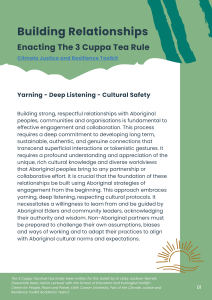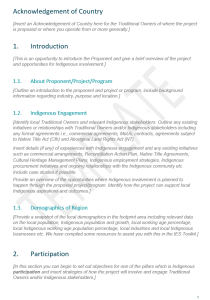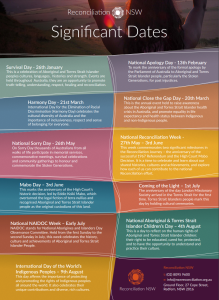1. Self-education
Community service organisations must begin by educating themselves about Aboriginal and Torres Strait Islander Peoples’ histories, cultures, the ongoing impacts of colonisation, and global frameworks like the United Nations Declaration on the Rights of Indigenous Peoples (UNDRIP). Understanding the colonial histories that have impacted Aboriginal and Torres Strait Islander Peoples is critical to engaging in respectful, equitable partnerships. The Building Power Guide provides practical steps for empowering Aboriginal and Torres Strait Islander Peoples to lead in this space. This includes understanding Aboriginal and Torres Strait Islander Peoples’ ecological knowledges, cultural protocols, and the principles of self-determination.

(Source: Caring for Country: Indigenous Well-being, Law, and Environmental Justice)
Address and reframing cultural load to colonial load
Aboriginal and Torres Strait Islander Peoples often experience what has traditionally been referred to as cultural load in professional environments, particularly when they are expected to act as representatives of their culture. However, some community leaders and scholars are now reframing this concept as colonial load to emphasise that the burden stems from colonial systems and practices, not culture itself. This perspective recognises that culture has always been a strength for Aboriginal and Torres Strait Islander Peoples—one that keeps individuals and communities well through cultural practices and connections. The colonial project, on the other hand, creates oppressive and exploitative conditions that impose this load. It is settlers, not First Nations Peoples, who are responsible for carrying the burden of dismantling colonial structures.
Organisations must acknowledge and address this distinction by supporting Aboriginal and Torres Strait Islander employees and creating inclusive workplaces where they are respected, valued, and fairly remunerated. This includes fostering an understanding of the impact of colonial structures and committing to actions that reduce systemic inequities without perpetuating the expectation that First Nations Peoples shoulder these burdens.
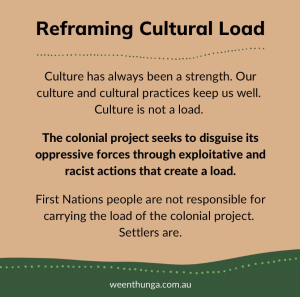
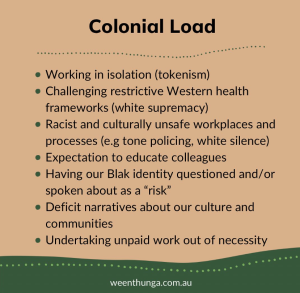
(Source: Weenthunga)
Map of Aboriginal and Torres Strait Islander language groups
In Australia, there are numerous diverse language groups of Aboriginal and Torres Strait Islander Peoples, each with its own unique cultures, customs, languages, and laws. They represent the world’s oldest surviving cultures, which continue to thrive and evolve in vibrant ways.
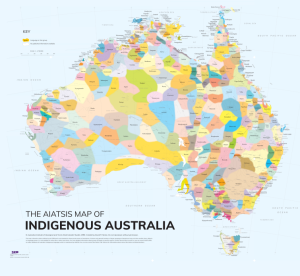
(Source: Map of Aboriginal Australia)
In the link below, you can find a map of Aboriginal and Torres Strait Islander languages in Australia.
Gambay: a Map of Australia’s First Languages
Resources:
Caring for Country: Indigenous Well-being, Law, and Environmental Justice
Australian Institute of Aboriginal and Torres Strait Islander Studies (AIATSIS)
Healthy Environment and Lives (HEAL) Network
Aboriginal Research Standards and Indigenous Cultural Intellectual Property (ICIP) (Terri Janke and Company, Lawyers & Consultants)
Indigenous Peoples Rights (Amnesty International)
2. Building relationships – enacting the 3 Cuppa Tea Rule
3. Indigenous climate justice
Indigenous climate justice is about ensuring that Aboriginal and Torres Strait Islander Peoples, who have been caretakers of the land for millennia, are at the forefront of decisions and actions addressing climate change. The impacts of climate change disproportionately affect Aboriginal and Torres Strait Islander communities, whose deep connection to Country is integral to their identities, cultures, and livelihoods. Climate justice, therefore, cannot be separated from their ongoing fight for land rights, self-determination, and cultural survival.
Aboriginal and Torres Strait Islander Peoples are already leading action for climate justice, grounded in their knowledge systems and relationships with Country. Their leadership is crucial in addressing environmental crises and the social injustices that have been exacerbated by colonisation and its ongoing legacies. A just response to climate change must centre Indigenous voices, knowledges, and solutions, supporting their sovereignty and right to protect and manage their lands.
Organisations led by Aboriginal and Torres Strait Islander Peoples are actively resisting destructive practices such as fossil fuel extraction while advocating for policies that align with their vision for a sustainable and equitable future. Indigenous climate justice is not about including First Nations Peoples in someone else’s agenda but about recognising that their fight for justice and the protection of Country is essential to achieving just and equitable climate solutions for all.
Example: Save our Songlines
Other Examples:
First Nations Organisations Fighting For Climate Justice
First Nations Clean Energy Network
First Nations Resistance + Climate Justice (The Commons, Social Change Library)
Indigenous Environmental Network
Resources for First Nations Justice: Allyship Resources
“On what terms can we speak?” Refusal, resurgence and climate justice
4. How to be a good Indigenous ally
Allyship means listening, learning, and supporting Indigenous-led solutions. It requires standing up against racism, recognising the value of Aboriginal and Torres Strait Islander cultures, and ensuring their voices are heard. Being an ally involves understanding the ongoing effects of colonisation and committing to challenging systems of inequality that continue to impact First Nations Peoples. This starts with educating ourselves, following the leadership of Aboriginal and Torres Strait Islander communities, and working in partnership towards shared goals. It is about recognising that allyship is a continuous, active process that calls for reflection, humility, and a commitment to unlearning harmful assumptions. Effective allyship means taking actions that support self-determination, such as engaging with First Nations-led organisations, respecting cultural protocols, and contributing to efforts that uplift Aboriginal and Torres Strait Islander voices. It also involves building strong relationships based on trust and accountability, standing together in the ongoing fight for justice, and ensuring that First Nations Peoples are at the forefront of decisions affecting their communities. Allyship is not just a role but a responsibility to create lasting, meaningful change.
Resources, books and films to help you be a better First Nation Ally
How to be a Genuine Ally (Yarn)
How to be a good Indigenous Ally (SBS)
How to be an ally to Aboriginal and Torres Strait Islander People (ReachOut)
How to be a Genuine Ally (Amnesty International)
How to be a better ally to First Nations People (Seed Mob)
5. Cultural humility and reflexivity
To create culturally safe environments, organisations need to embed cultural awareness and respect into their policies, practices, and interactions with Aboriginal and Torres Strait Islander communities. This includes adopting cultural humility, which involves ongoing reflection on one’s biases and limitations, and ensuring that all engagement is underpinned by respect for cultural practices and lived experiences.
Resources:
6. Identifying Aboriginal and Torres Strait Islander organisations in your region
To identify Aboriginal and Torres Strait Islander organisations in your region, visit the links below. You can use the search function or search WA and then use ctrl+f to search for your location.
Office of the Register of Indigenous Corporations
Office of the Register of Indigenous Corporations WA search
Other options:
Perth Aboriginal Resources Directory
Western Australia Aboriginal and Torres Strait Islander Organisations, Aboriginal HealthInfoNet
7. Aboriginal and Torres Strait Islander Peoples engagement tools
On the Northern Australia Infrastructure Facility website of the Australian Government, you can find relevant information, resources, tools, and templates that can help inform how you engage with Aboriginal and Torres Strait Islander communities.
Access Full Document: Indigenous Engagement Strategy – Template (Optional)
Indigenous Engagement Strategy – Template
Schedule of Obligations – Template
Indigenous Engagement Strategy Progress Report – Template
8. Free, prior and informed consent
Community service organisations (CSOs) must adopt Free, Prior, and Informed Consent (FPIC) as a foundational practice in their climate justice work, especially when engaging with Aboriginal and Torres Strait Islander Peoples. This means ensuring that any initiatives or decisions affecting these communities are made with their full participation and consent, respecting their self-determination and cultural practices. CSOs should provide clear, accessible information about the proposed actions and allow enough time for communities to make informed decisions without pressure. Incorporating FPIC into climate justice work ensures that the voices and rights of Indigenous Peoples are central to addressing climate impacts equitably and inclusively.
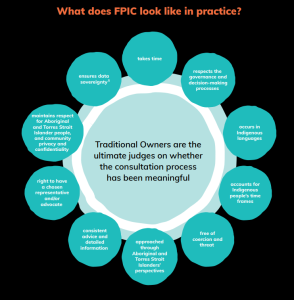
(Source: Engaging with Traditional Owners)
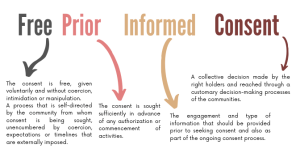
(Source: Free, Prior and Informed Consent)
Resources:
Free, prior and informed consent (Oxfam Resources)
Engaging with Traditional Owners (AIATSIS)
9. Ensure fair remuneration and payment
Engaging Aboriginal and Torres Strait Islander Peoples must include fair remuneration for their knowledge, time, and leadership. This applies to partnerships, consultation processes, and any other involvement in climate justice initiatives. Fair remuneration is a crucial aspect of redistribution, ensuring that the benefits of climate justice and disaster resilience projects are shared equitably, alongside economic, environmental and social justice.
Resources:
Leading Practice Principles: First Nations and Renewable Energy Projects
Fair Work Australia: First Nations People
Employment of First Nations People
10. Centering Country in decision-making
Aboriginal and Torres Strait Islander Peoples’ relationships with Country are integral to their cultural identity. Climate justice tools and strategies must prioritise Country, moving beyond a human-centred focus. Country should be viewed as an active participant whose well-being is intrinsically tied to people’s well-being. This requires incorporating Aboriginal ecological knowledges into decision-making and ensuring that climate solutions support the land’s regenerative capacity.
The two resources, Justice, Culture, and Relationships: Australian Indigenous Prescription for Planetary Health and Caring for Country: Indigenous Well-being, Law, and Environmental Justice, highlight the deep connections between Indigenous culture, well-being, and environmental stewardship. Both works emphasise how caring for Country is not just about protecting land but is integral to Indigenous identity, health, and justice. The resources discuss the importance of Indigenous knowledge systems, which offer holistic approaches to planetary health by fostering respectful relationships with the environment. These resources argue that recognising and incorporating Indigenous legal frameworks and cultural practices are essential to achieving environmental justice, as they provide a blueprint for sustainable living and a more balanced relationship with the Earth.
Resources:
First Nations Clean Energy Toolkit
11. Promote self-determination
True engagement means empowering Aboriginal and Torres Strait Islander Peoples to lead climate justice efforts. This involves transferring decision-making power, resources, and authority to Aboriginal and Torres Strait Islander communities, ensuring that their voices are central in shaping the policies and initiatives that affect them. The Building Power Guide provides a framework for Aboriginal and Torres Strait Islander Peoples to engage in advocacy and leadership.
Resources:
Pathways to Partnership: Gunaikurnai and Major Projects
12. Inclusive decision-making
The principle of “nothing about us without us” is crucial in climate justice work. Aboriginal and Torres Strait Islander Peoples must not only be consulted but must be supported to actively participate in all levels of decision-making. This means involving them from the planning stages to the implementation and evaluation of projects, ensuring that their knowledge, rights, and perspectives guide the entire process. The Aboriginal and Torres Strait Islander Lived Experience-led Peer Workforce Guide lists 10 truths to centre Aboriginal and Torres Strait Islander voices:
- Commit to unearthing and acting on workplace truths – however uncomfortable this may be
- Ensure any Aboriginal and Torres Strait Islander-related work is Indigenous-led and informed
- Develop organisational principles to make it clear how Indigenous community engagement and employment should work in practice
- Focus on workplace readiness (cultural safety) rather than worker readiness
- Recognise identity strain and educate non-Indigenous staff about how to interact with their Indigenous colleagues in ways that reduce this
- Recognise and remunerate cultural load as part of an employee’s workload
- Consult with Indigenous staff on how to minimise cultural load while maintaining organisational activity
- Focus on sustainable careers and career development rather than just short-term appointments
- Take action to address workplace racism
- Look to high-impact initiatives – those that research shows are linked to better wellbeing and retention for Indigenous staff
13. Significant dates for Aboriginal and Torres Strait Islander Peoples
Find out more:
Survival Day January 26
National Sorry Day 26 May
1967 Referendum 27 May
National Reconciliation Week 27 May to 3 June
Mabo Day 3 June
NAIDOC Week – first full week of July
National Aboriginal and Torres Strait Islander Children’s Day 4 August
UN International Day of World’s Indigenous Peoples 9 August
14. Stolen generations and healing
Healing is essential to the work of community service organisations (CSOs), particularly when addressing intergenerational traumas experienced by Aboriginal and Torres Strait Islander Peoples due to policies like the forced removal of children during the Stolen Generations. These removals caused profound disruptions to families, cultures, and identities, resulting in complex trauma that persists today for many peoples. Healing initiatives, such as those provided by Link-Up services, focus on reconnection with family and Country, offering vital emotional and social support.
For CSOs working towards climate justice and resilience, fostering healing is closely linked to building strong relationships with Aboriginal and Torres Strait Islander Peoples. Recognising the deep connection between people, Country, and culture can guide organisations in adopting approaches that centre on self-determination, cultural safety, and the restoration of relationships with Country. By integrating healing practices, organisations can promote resilience and ensure that responses to climate challenges equitably address the legacies of historical and ongoing injustices.
Read more:
The Stolen Generations, Australian Institute of Aboriginal and Torres Strait Islanders
Stolen Generations, Australian Indigenous HealthInfoNet
Terminology disclaimer
*We acknowledge that many Aboriginal Peoples in Western Australia prefer to use their own nation names or the term ‘Aboriginal’ when referring to themselves. However, we recognise that various resources and publications also use terms such as ‘Indigenous’, ‘Aboriginal and Torres Strait Islander Peoples’, and ‘First Nations.’ In the spirit of respect and inclusivity, we employ all these terminologies in our communications. This approach aims to empower all Aboriginal and Torres Strait Islander Peoples to self-determine their preferred terminology and to ensure our language is accessible to a wide audience. Our goal is to honour the diversity within Aboriginal and Torres Strait Islander communities while maintaining clarity in our discussions in this toolkit.
Read more:
Indigenous Peoples’ Principles For Just Transition
Ways of Working with Aboriginal Peoples, Strong Spirit Strong Mind
